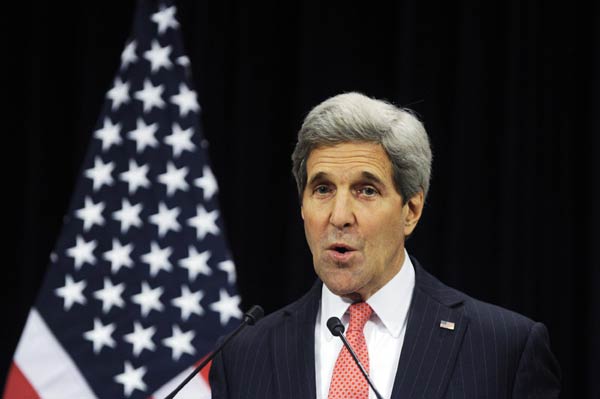US-led coalition damages Islamic State, but fight is long
Updated: 2014-12-04 11:17
(Agencies)
|
|||||||||||
 |
|
US Secretary of State John Kerry gives a statement after a round table meeting of the global coalition to counter the Islamic State militant group at NATO headquarters in Brussels December 3, 2014. [Photo/Agencies] |
BRUSSELS - The US-led coalition has inflicted serious damage on Islamic State, carrying out around 1,000 air strikes so far in Iraq and Syria, but the fight against the militants could last years, US Secretary of State John Kerry said on Wednesday.
The United States and its allies began air strikes in September after the Sunni militants made large territorial advances. The Iraqi army, Sunni tribal fighters and Kurdish forces have since recovered some ground from the group which in its Arabic acronym is known as Daesh.
"It is much harder now than when we started for Daesh to assemble forces in strength, to travel in convoys and to launch concerted attacks," Kerry said at a meeting in Brussels of some 60 countries involved in the coalition.
"No large Daesh unit can move forward aggressively without worrying what will come down on it from the skies," he added.
But he said the campaign would be a long one, saying: "Our commitment will be measured most likely in years."
Kerry declined to comment on reports from officials in Washington that Iran - not part of the US-led coalition, but a neighbour and ally of Iraq - had conducted air strikes.
"Nothing has changed in our fundamental policy of not coordinating our military activity, or any other activity, at this moment with Iranians. We are not doing that," he told a news conference.
Kerry said he hoped countries in the region would take the lead in paying for reconstruction of parts of Iraq once they had been seized back from Islamic State control.
"There are a number of countries in the region that are talking about a...reconstruction fund," he said.
Kerry said the United States had taken no decision to back a buffer zone along the Syria-Turkish border. The Wall Street Journal said this week a safe zone was a possible US concession to Turkey in return for use of bases to launch attacks on Islamic State militants in Syria.
"There is a lot of discussion going on about the way we will go forward but it is premature to suggest at this moment of time that we are close to making a decision or moving forward with any form of a safe zone or a buffer zone," Kerry said.
Iraqi Prime Minister Haider al-Abadi told the Brussels meeting his armed forces needed help with arms, ammunition and training, Croatian Foreign Minister Vesna Pusic said.
Iraq plans to ask NATO to help train its security forces, the military alliance said.
In a statement issued after the meeting, the anti-Islamic State coalition said some members had said that effective ground forces were needed to ultimately defeat the militants.
State Department officials said that referred to strengthening moderate rebel forces in Syria.
Syrian President Bashar al-Assad said in an interview with a French magazine that air strikes in Syria had not made a difference and the only way to defeat Islamic State was with ground troops. "You can't end terrorism with aerial strikes," he told Paris Match.
Related Stories
Afghans allege NATO airstrike kills 7 civilians 2014-10-13 21:17
US: Iran launches airstrikes into eastern Iraq 2014-12-03 16:53
Iraq official: Arrested woman not IS leader's wife 2014-12-03 17:31
Waterborne disease takes toll on Islamic State-held city in Iraq 2014-12-02 07:49
Obama moves to double US force in Iraq 2014-11-09 08:02
France says air strikes take out weapons arsenal in Iraq 2014-10-24 16:11
Today's Top News
HK protest founders turn themselves in
China to launch $8.13b fund to fight pollution
Capital mulls new building rules
154 'foxes' surrender before deadline
ICBC opens branch in London
US, EU leaders discuss potential action against Russia over Ukraine
Tolerance ends, HK chief vows
Nation 'ready for new era' of lower GDP growth rates
Hot Topics
Lunar probe , China growth forecasts, Emission rules get tougher, China seen through 'colored lens', International board,
Editor's Picks

|

|

|

|

|

|





